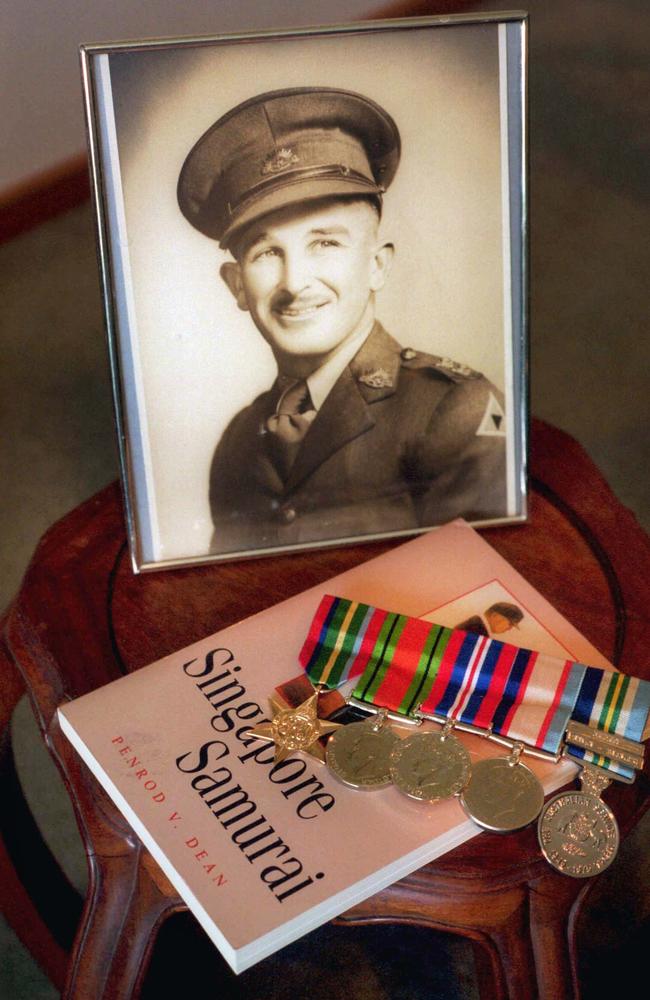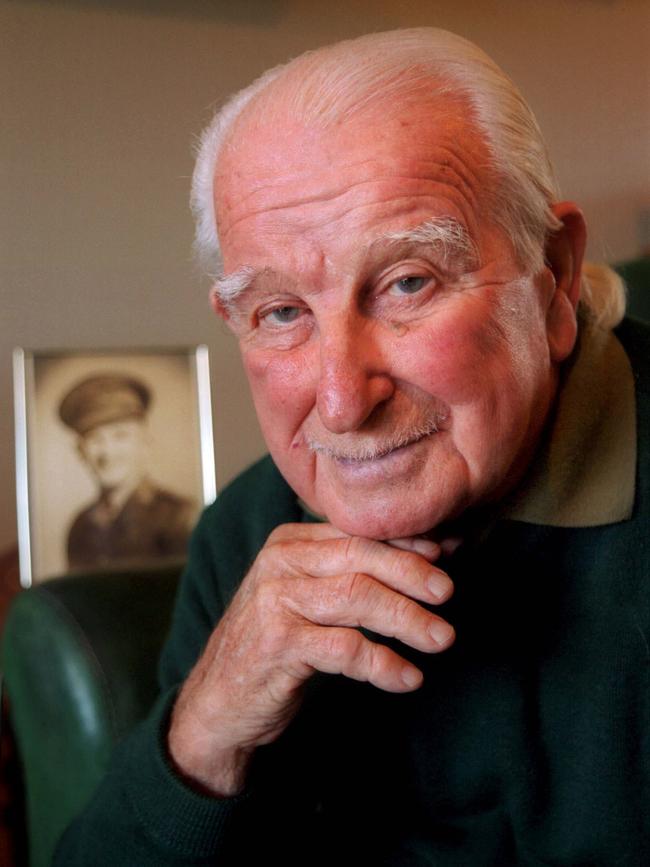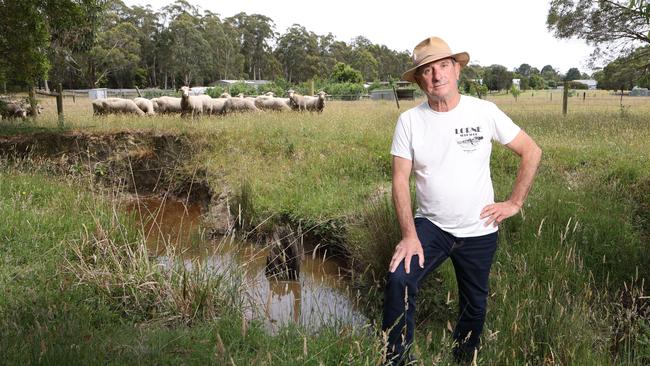This story is not about Dad’s service – it’s about the healing power of the land
During his incarceration in Outram Road, my father was tortured, witnessed unspeakable war crimes and was aware of the execution of numerous prisoners, often by samurai sword. After giving up work at 57, he went country and had many happy, healing years.

At the end of World War II my father, Penrod Vance Dean, a lieutenant in the Australian Army, was released from Changi Prison in Singapore. He previously had escaped from that prison and following his capture in Malaya was sentenced to two years solitary confinement in Outram Road jail, also in Singapore. Outram Road was a death camp and he survived, I think, because of his love for my mother and his then two children.
During his incarceration in Outram Road he was tortured, witnessed unspeakable war crimes and was aware of the execution of numerous prisoners, often by samurai sword.
In 1946 he was selected as one of 12 Australians to give evidence in the Tokyo war crimes trials. Ultimately that evidence was given by affidavit as the trials proceeded slowly and he returned to Perth for the birth of my sister in December 1946. That affidavit is now part of the permanent collection at the Changi War museum.
But this story is not about Dad’s wartime service. It is a story of the healing power of the land for him and why I left city life and ultimately a life in the law.

I was born in 1957 and was fortunate to not experience fully the impact of the war on my father’s psychology. But I was aware of it as I grew up and he would often lapse into darkness.
After he returned from Tokyo in 1946 he and the family lived in the suburbs of Perth until 1948, when he and Mum bought a small farm at Roleystone in the hills outside the city. There he undertook mixed farming and sought to find peace in the cycle of the seasons on the land. As with most soldiers, nurses and others who returned from the war, he received no psychological counselling or treatment for the impact of what he had experienced. He was expected to “get on with it”, whatever that meant. And while Roleystone didn’t help him at that time, it sowed a seed in the story of the family, so when I found life in my work as a judge a never-ending cycle of trauma and tragedy, I decided to move to the land, too, without really knowing what that meant either.
In 1995 a firm of Melbourne solicitors showed some faith in me and briefed me as junior counsel for Alan Bond. Across three years or so I worked with two great silks, Julian Burnside and Ian Callinan, defending Bond as his commercial life wound its way through the criminal courts. And I was in my family’s home town, Perth.
One weekend I decided to find Penrod’s farm at Roleystone, now just outside the urban fringe. I drove up there with one of the team from the case and by mobile phone rang Dad for directions. I found the rundown house and he asked me if I could see the orchard. I told him I could, as I recall, but I couldn’t. I decided to have a look around. No one was home and it looked as if the place was unoccupied. As I walked into the garden I saw something pushing up out of the dirt. It was a horseshoe. For reasons that I don’t fully understand, that horseshoe has been with me since that day and, like all superstitions, it bringeth both good and ill fortune.
Penrod and Mabel, a name now back in fashion, moved with the family to Melbourne in 1952. He left the farm behind and became a successful corporate manager but, as with so many men and women of that generation, the years of the Depression and the war were always silently singing their dark hymns to them. And in 1971 that music overwhelmed him and at the relatively young age of 57 he gave up full-time work and moved to the Victorian coast where he had many happy healing years.

Later in life he and Mum had some land where they found further peace and longevity. And so when my life as a judge became constrained, I too went to country – to Dja Dja Wurrung lands.
Recently a public debate has begun about the place of the Aboriginal ceremony of welcome to country in our lives and at events such as football finals. During the voice referendum debate Tony Abbott declared he was getting “a little bit sick of welcomes to country because it belongs to all of us, not just some of us”. Similar comments have been made by others since the defeat of the referendum.
More recently, in The Australian’s 2025 Australia Day edition, Geoffrey Blainey observed: “Our welcome to country was perhaps a useful experiment but can be challenged. Those authoritarian personages, the Indigenous elders who presided during tens of thousands of years, are paraded before us as being virtually free from faults. A ceremony so undemocratic should be rewritten or abandoned.”
For my part, every time I now see or hear a welcome to country I am reminded in a deeply personal way of the cycle of life that has taken place on my farm for an eternity. This welcome to the country, and acknowledgment of its spiritual and cultural place in our lives, has been a great source of healing and strength for me. A welcome to country is an assertion of Aboriginal people’s spiritual and fundamental cultural connection to the land and, as was confirmed in Mabo, it does belong to Aboriginal people. The welcome to country is a recognition of that.
I moved to the Macedon Ranges in 2021. I didn’t really have a plan and was still working full time at the court. I knew I needed a change of paths. The healing power of the country was something I grew up with and saw in my father but I didn’t know what it meant for me or how to find it.

The primary task at the farm when I moved here was to eradicate gorse, a weed given by our Scots friends that is destructive and virulent. I initially opted for spraying but was left with hectares of poisoned plants that, in turn, inevitably would poison everything else. And the fences were down. The roos had taken over. The creek that fed the Campaspe River was infested with weeds. Foxes roamed the place and the dam was full of sediment. Welcome to country. I moved to the farm from inner-city Melbourne after 10 or so years on the bench.
As they say, patience is a virtue, a virtue I was working on. The land taught me that patience was a necessity. But after a year the gorse was getting under my skin, so to speak. So I rang Terry, the district problem solver. I told him I needed a solution to the gorse. “Mark, you’re in luck,” he said as I looked out in frustration at my Scots curse. He told me a young enterprising guy here had imported a machine from Europe that ate gorse for breakfast. And so it did. Like all great leaps forward, human ingenuity solved my problem and the management of the gorse gave the farm a new life and, in turn, me a life too.
Gorse has an eternal life, it seems, but regular cutting and mulching controls it. Controlling the gorse removed one of the foxes’ and rabbits’ main habitats, opened up access to the creek and allowed natural grasses to grow back. It also meant there was more grass for more roos. In turn the weaker ones could not make it through a ranges winter. And I began to see more rabbits. The result? Wedge-tailed eagles had food on the farm and with them came an energy I had not lived with before.
As Archie Roach so profoundly said, they were watching over me. And as the creek grew in health the water birds returned too. There were more frogs and yabbies. The sounds on a still day of the frogs and birds began to replace the constant replay of what I had said that day in court.
It did not happen overnight but gradually as these lands became alive again I saw life through different eyes and decided to retire from the court after 12 years’ service and 27 before that as a barrister and senior counsel.
There is much I don’t know about these lands and every day here reveals how much there is for me to understand. Today a mob of yellow-tailed black cockatoos has visited, a currawong is feeding its youngster from the berries next to the vegetable garden and I moved a big old male roo on into the forest. Like me, I suppose, his time is coming and it looks as if he has left the mob.
He regally lies around in the orchard and excites our dog, Terry the terrier. My neighbour is worried about the roo and wants to take him out with a gun. But I think that roo is entitled to a dignified exit and so I chase him up in the paddock vehicle and move him into the safety of the trees. Bunjil will find his carcass one day and the cycle of life here will go on.
Mark E. Dean KC is a retired judge, writer and farmer.



To join the conversation, please log in. Don't have an account? Register
Join the conversation, you are commenting as Logout